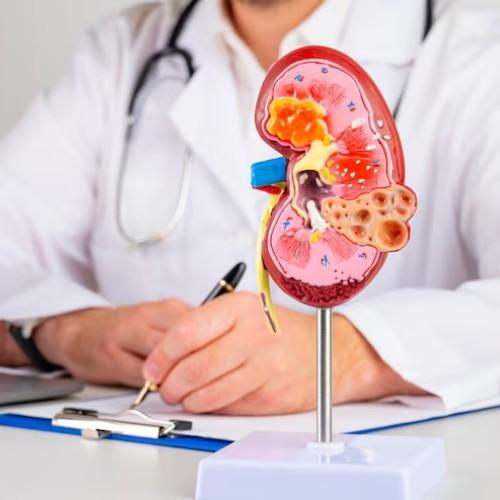Kidney shrinkage or atrophy (atrophic kidney or renal atrophy) refers to a medical condition when the size of your kidney is smaller than the average size (about 5 inches). Either one or both of your kidneys can be affected by this ailment. Major causes include a low blood supply to the kidney(s) and/or nephron loss in the body. If you too are worried about this ailment and wondering, “Is kidney shrinkage dangerous?”, then you are at the right place. This article will shed more light on this disease.
Some Details About Kidney Shrinkage
Kidney shrinkage or atrophy is simply a condition when your kidney size is smaller than average. This condition can be singular or bilateral. Major causes are:
- Blocked kidney artery (renal artery stenosis)
- Blocked urinary tract
- Kidney stones
- Long-lasting kidney infections (pyelonephritis)
- Autoimmune diseases of the kidney
Signs and Symptoms
Though you rarely get any visible symptoms, you may experience:
- Painful urination
- Itchy skin
- Swollen feet and hands
- Pain in the abdomen and flank
- Urinating frequently
- Fatigue
- Loss of appetite
Don’t wait until it’s too late — check your kidneys now.
Contact Now
Diagnosis and Testing
Ultrasound, CT scan, MRI, and Estimated glomerular filtration rate (eGFR) are used to detect abnormalities regarding the size of the kidneys.
Is Kidney Shrinkage Dangerous?
The short answer is yes. As the kidneys shrink, their ability to filter waste effectively gets compromised. If left untreated, you may suffer from severe consequences such as fluid retention, electrolyte imbalances, and toxins build-up in the body.

Ayurvedic Medicines for Kidney Shrinkage
The most effective herbs to treat this renal ailment are:
- Gokshura (Tribulus terrestris): Gokshura is often used in Ayurveda to manage various renal disorders. The diuretic properties of this Ayurvedic herb have been linked with healthy urination in our body. This results in a thorough flush out of toxins from the body. This is particularly helpful in inhibiting the formation of renal stones in the body, one of the major causes of kidney shrinkage.
- Punarnava (Boerhavia Diffusa): Punarnava has both diuretic and anti-inflammatory properties. This herb helps manage the urea and creatinine levels in our body. Punarnava may also help regenerate renal tissues and repair the already damaged renal tissues in the body.
- Varuna (Crataeva nurvala): This herb, by assisting in the purification of the blood, reduces your risk of renal infections. Regularly consuming this herb improves your overall renal health.
- Bangshil: Bangshil treats genito-urinary tract infections due to its antibacterial and antiseptic properties. Bangshil has been found effective in treating mild prostatomegaly, urethritis, vaginitis, and pyelonephritis.
- Pashanbheda: Pashanbheda controls blood pressure and blood glucose levels in the body. This assists in the healthy functioning of the kidneys.
The herbs mentioned above are safe to use, though, you must consult your healthcare provider before consuming any herb for supporting your renal treatment.
Home Remedies for Kidney Shrinkage
-
Consume a Low-Potassium Diet: High-potassium foods like bananas, oranges, potatoes, spinach, and tomatoes must be consumed in moderation by renal patients. Include low-potassium foods such as apples, cauliflower, peppers, grapes, and strawberries in your diet.
-
Moderate Salt Consumption: A high sodium intake for a prolonged period results in high blood pressure. This damages our renal cells and may aggravate the kidney shrinkage symptoms. You must not consume high-salt meals.
-
Stay Hydrated: Fulfill your hydration needs with water, coconut water, herbal teas, juices, etc. Being well-hydrated is vital for good renal health.
-
Reduce Protein Consumption: Animal-based protein is not particularly recommended to renal patients. Consuming a high concentration of meat, fish, chicken, etc. leads to a higher production of creatinine in the body. This puts a lot of pressure on our kidneys, resulting in their poor functioning. If possible, replace meat with tofu, cheese, etc. that too after having a consultation with your doctor.
-
Yoga: Yoga has poses like Salamba Bhujangasana, Paschimottanasana, Setu Bandhasana, Shashankasana, Pawanmuktasana, and Mandukasana that are known to increase the blood flow toward the kidneys. A higher blood flow to the kidneys greatly alleviates the symptoms related to this renal disorder.

-
Keep Stress in Check: Stress can further aggravate your health issues. Practice deep-breathing exercises in a calm place to manage stress.
Kidney shrinkage interferes with the normal functioning of your kidneys. When kidneys shrink, they don’t work as efficiently as supposed to, leading to multiple issues for you. If you notice symptoms like swelling or changes in urination, it will be a good idea to consult with your nephrologist. Remember, early treatment will help you avoid multiple complexities in the future.






